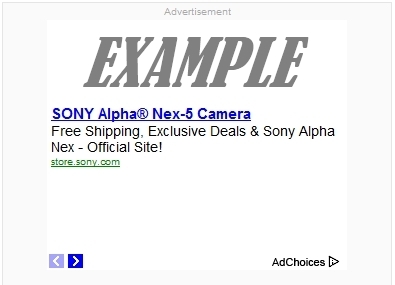 Dear Google: I am writing to tell you one important fact. I bought the Sony NEX-5N camera. As you know, a friend of mine contacted me through my Gmail account, because he had recently purchased the Sony and he was ecstatic. I purchased the camera with the 19-55 mm lens, and then I also purchased the 55-200 lens as well. If you must know, I also purchased a bag, a tripod, and some filters. I paid roughly $1000 from Amazon.com and used my personal credit card. The stuff arrived about a week later, and I paid my Visa bill one month later.
Dear Google: I am writing to tell you one important fact. I bought the Sony NEX-5N camera. As you know, a friend of mine contacted me through my Gmail account, because he had recently purchased the Sony and he was ecstatic. I purchased the camera with the 19-55 mm lens, and then I also purchased the 55-200 lens as well. If you must know, I also purchased a bag, a tripod, and some filters. I paid roughly $1000 from Amazon.com and used my personal credit card. The stuff arrived about a week later, and I paid my Visa bill one month later.
Like my friend, I love my Sony camera. It is amazing. The camera can do three things that no other camera can do. 1) It is incredible in low light. So incredible that I have yet to take a picture using the flash. 2) It takes video at 60 frames per second, where as all other cameras are stuck at 30 fps, and 3) It has a panorama mode that is incredible. You move the camera in one direction, and it takes multiple photos and stitches them all together on the fly. Amazing.
So I bought the product and I am happy with it and I paid for it. So here is the reason that I am writing you. The Sony ads for my camera are following me around like some weird horror movie. I don’t care what web site I go, there is always a Sony ad for my camera. Apparently, you know that I visited Sony’s web site, but you have no way of knowing that I actually purchased the camera. Perhaps, I should have purchased the camera from Sony’s web site rather than Amazon’s? I have searched on my settings in my browser, and there is no way to inform Google of this purchase.

To be honest, I feel sorry for Sony. They are making an excellent product and they are losing money to you guys trying to convince me to purchase a second one. BTW, it was the recommendation of my friend and not the stupid Google advertising which convinced me to purchase the camera.
One of your mantra’s is “Do No Evil”. I would not put this in the evil category. It is just kind of stupid. We all have this image of Google of being this company full of super smart, hip and young people. Clearly this is no longer true.
The ads will not relent, and it is making me mad. So mad, that I have now decided to start using Bing. I was hesitant at first, after all, I was not unhappy with Google’s search results. It’s your business practices that tick me off. Bing is actually quite good. I do miss Google Maps, but Bing’s search results are only slightly different than Google’s and I am adjusting to those nuances.
All of this makes wonder. What is Google’s vision with this robobot advertising model? It is certainly not working for me, and if Sony is paying for the advertising, it probably isn’t working for them. So what next? It makes me worry. Will Google find a more intrusive way to make money?
This is all part of a disturbing trend. Facebook is now tracking all of the articles certain people read on the internet. I get a little update every day about what articles my Mom and others are reading. Facebook has no idea on whether my Mom likes the article or whether she found it informative. Facebook doesn’t even know whether she made it to the end of the article. But somehow, I am supposed to find this information interesting. So interesting that I want to read the article too. But of course, if I did that, then Facebook would start tracking all of the articles that I read.
So in conclusion, Google wants to track everything that I buy, so they can jam advertisements in my face non stop until I buy. Problem is that they don’t know when I buy so they just keep slamming you with ads of products you already bought. Facebook wants to track every article you read and share with all your friends. Somehow, I think that the internet is taking a step backwards.
Opting Out of Behavioral Advertsing
The NAI Opt-out Tool was developed to allow consumers to “opt out” of the behavioral advertising delivered by our members of the Network Advertising Initiative.
Using the NAI Tool, you can examine your computer to identify those member companies that have placed an advertising cookie file on your computer.
To opt out of an NAI member’s behavioral advertising program, simply check the box that corresponds to the company from which you wish to opt out. Alternatively, you can check the box labeled “Select All” and each member’s opt-out box will be checked for you. Next click the “Submit” button. The Tool will automatically replace the specified advertising cookie(s) and verify your opt-out status.
Opting out of a network does not mean you will no longer receive online advertising. It does mean that the network from which you opted out will no longer deliver ads tailored to your Web preferences and usage patterns.–networkadvertising.org




